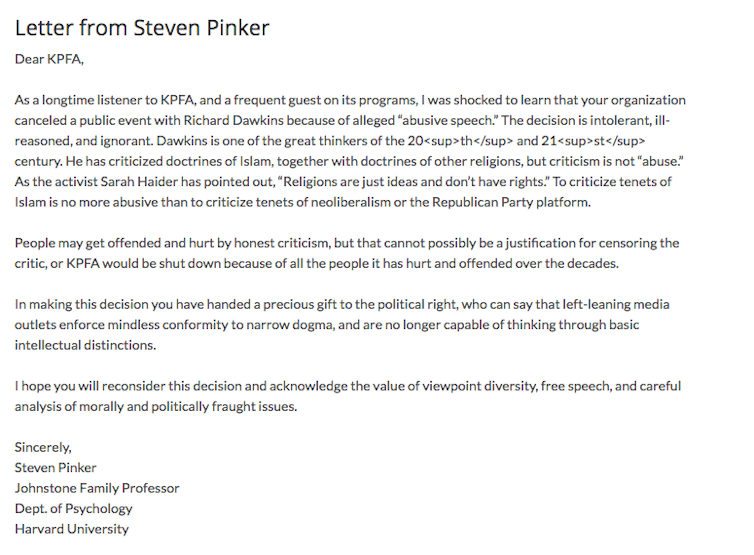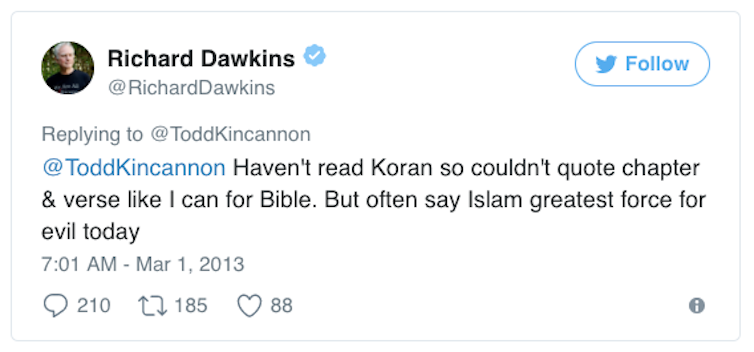Richard Dawkins was “no-platformed” – banned – in July from appearing on Berkeley, California, radio station KPFA following a series of complaints made to the station regarding his use of “abusive speech” against Islam.

A notoriously vocal critic of religion and the author of The God Delusion, Dawkins’ invite was rescinded because, according to KPFA, his comments on Twitter and elsewhere had “offended and hurt … so many people” in relation to their religious identity.
In a letter of apology to those who had bought tickets to attend the event, and as a preemptive response to criticism, the station also stated: “While KPFA emphatically supports serious free speech, we do not support abusive speech.”
Dawkins responded to the claims in an open letter posted on his website. He denied that he had used such abusive speech against Islam, stressing that any critique he had made had instead been aimed at Islamism. He also challenged KPFA to provide evidence of their claims against him.
Counter speech or gagging?
The station’s decision follows a now-familiar pattern of similar incidents of no-platforming at various institutions. Responses to such cases are easy to predict, with those in favour lauding the decision not to provide a public platform for offensive views. Those who fiercely oppose the concept believe it signals a clear rejection of the liberal commitment to free speech, with many citing it as a form of censorship.

Both of these positions, however, appear to neglect a key feature of the no-platforming phenomenon: the nature of the platform itself. No-platforming remains one of the clearest forms of counter-speech available to those who seek to reject a particular point of view. As a concept, its rationale stems from a rejection of the “free marketplace” model of free speech, a belief based on the view that, where there are no restrictions on speech, the best or “most truthful” ideas will prevail.
Access to having one’s voice heard in a public forum remains a privilege afforded to the very few, most often denied due to disadvantage in the form of race, class, gender or religious identity, among other things.
As a method of response against views with which it disagrees, then, KPFA has clearly exercised its (perfectly legitimate) right to not include a particular speaker on its show. As a proudly left-leaning organisation committed to providing a voice for otherwise disadvantaged groups and “promoting community expression”, the producers of the show appeared to respond to legitimate concerns of their listeners.

With its particular community-based ethos, KFPA is under no obligation, moral or otherwise, to include speakers they or their listeners decide are at odds with the kind of culture they aim to promote in relation to their brand. As a form of counter-speech, then, KPFA has made clear through its no-platforming that it disagrees with Dawkins’ views.
Whiff of censorship
Why, then, do cases of no-platforming such as this give off an air of censorship? What seems to raise cause for concern, and common to most critiques of no-platforming, are the justifications for employing this method of counter-speech in response to views one disagrees with.
This critique seems to be sound, for it clearly distinguishes between cases in which a speaker has not been invited in the first place, and cases in which a speaker has had an invitation revoked, often following mounting pressure from dissenters.
In its statement, KPFA justifies its decision based on the the offence suffered by listeners through Dawkins’ critique of Islam. What is implied, then, is that including Dawkins on the show would not only provide him with an undeserved platform, but would further offend the sensibilities of listeners who may be sensitive to his views on Islam.
As an organisation which aims in its mission statement, to “promote freedom of the press” and to act as “a forum for various viewpoints”, however, risk of offensiveness does not appear to be a satisfactory justification for no-platforming Richard Dawkins.
This is where the context of the platform comes in handy. No-platforming is often a reasonable method of counter-speech, particularly when the speaker in question is seen to hold an oppressive position of power against those who feel silenced in their response.
Tackling the problem
But in this case it appears that engaging with the views of Dawkins might have better served the purpose of tackling views with which the station disagrees. By inviting him on the show, the producers (and perhaps listeners) would be in control of the parameters of both the platform and the conversation. They could have confronted Dawkins on the statements they found offensive, perhaps leading to a greater mutual understanding between Dawkins and his critics.

One is reminded here of the BBC’s 2009 decision to invite British National Party leader Nick Griffin as a guest on Question Time, a decision which, despite a great deal of protest prior to its airing, proved to be catastrophic for the leader and had a considerable impact on the party’s legitimacy.
In the spirit of free speech, then, it is clear that there are other, often more pragmatic methods for dealing with speech one disagrees with. Far from simply giving a speaker an undeserved platform, engaging with views one disagrees with can serve the purposes of free speech better, by allowing speakers to listen to the views of those who may be offended and offering them the chance to respond.
We need to encourage debate through “rigorous-platforming”, that is, giving people the opportunity to be held accountable for their views, rather than no-platforming them altogether.

